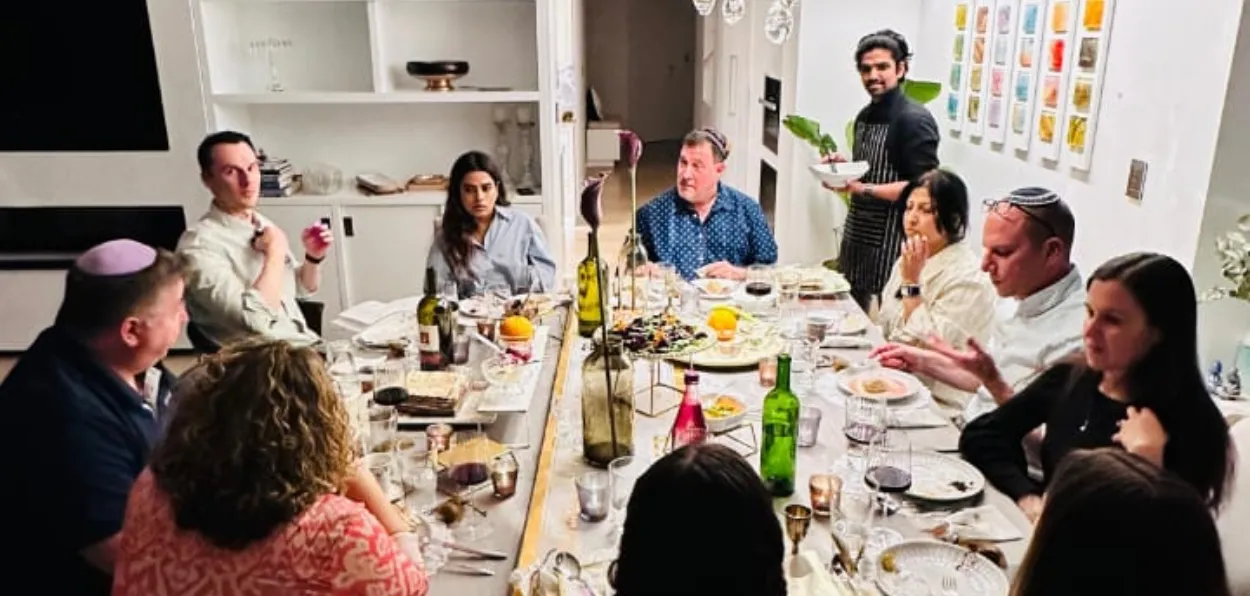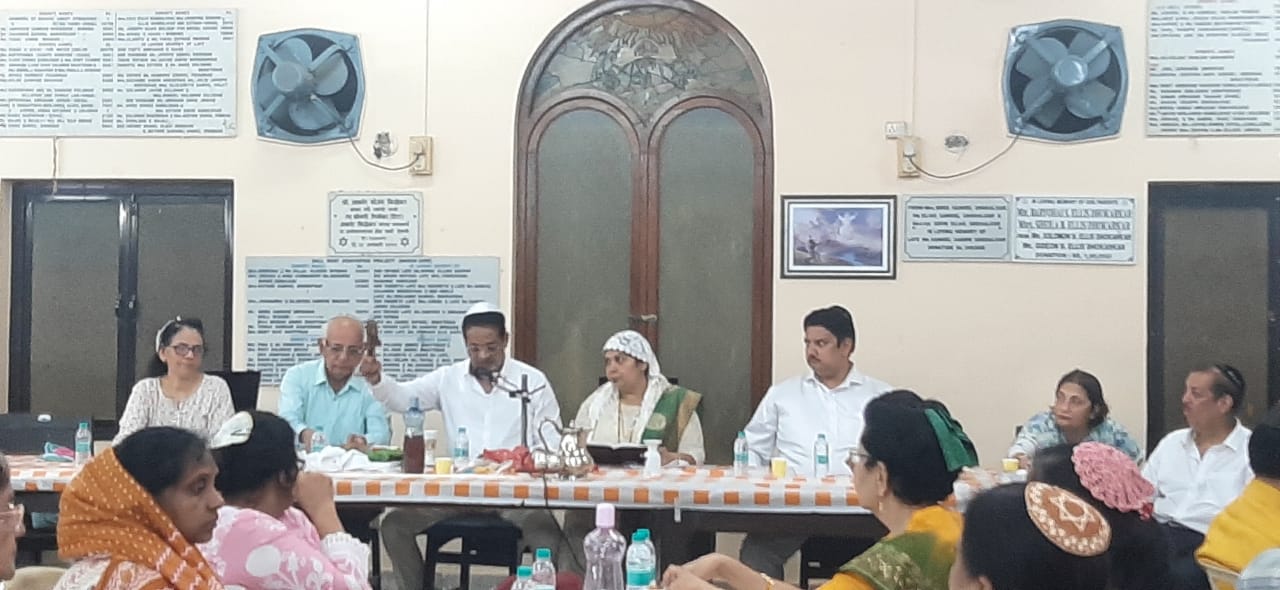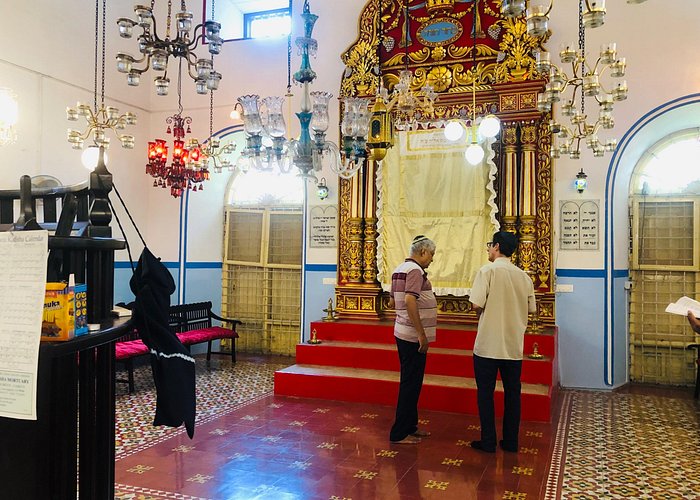
Aditi Bhaduri
It is that time of the year when the earth bursts into life, throwing up her bounties of flowers and plants and crops. Creation revels in itself and we mortals pay homage to life through the different festivals we have thought up - Nowruz, Bihu, Poila Boishakh, Easter.
Invariably the voice of the late David Nahoum echoes in my ears. "Passover, also known as the ritual of the unleavened bread, is a most important Jewish festival – it marks the end of Jewish exile in Egypt and their exodus to the promised land," he had explained, sitting in a corner of the iconic Jewish bakery Nahoum's in Kolkata's equally famous New Market, which his grandfather had a century ago built.
While I had known of a Jewish festival called Passover, it was David who explained to me its significance and rituals. And amidst all the festivals being celebrated during this joyous and magical time of year, Passover is also being celebrated this week in India, even in different regions of the country, though few know about it.
The poignant yet joyous Jewish feast of Passover or Pesach is one of the three most important festivals of this ancient religion. It marks the end of Jewish exile in Egypt and their exodus to the Promised Land.
The story goes that in the 14-13 century BC, the Jews who had about 500 years earlier settled in Egypt were being oppressed by the Egyptians whose Pharaoh, historians believe, was Ramses II. The Bible says that the children of Israel appealed to their God Yahweh, who promised them deliverance through Moses.
When all threats and supplications by Moses and his brother Aaron failed to secure freedom, Yahweh sent his Angel of Death to Egypt to kill every first-born Egyptian son—from Pharaoh’s heir to the son of the slave woman.
Jews were spared but every Jewish family would have to kill a lamb or young goat and with its blood smear the lintel of their houses to alert the Angel of Death to their presence when it passed through on the appointed night. Thus originated Passover or Pesach. That very night, the story says, the Jews left Egypt.
 Pessach Seder organized by ORT at Tiphereth Synagogue Hall, Mumbai
Pessach Seder organized by ORT at Tiphereth Synagogue Hall, Mumbai
Passover is also called the “feast of the unleavened bread” as the ban on leaven is its most characteristic feature. During Passover - celebrated for seven days by Jews in Israel and eight days by those abroad, as a reminder that they are still not in the Holy Land - only unleavened bread or matzos is eaten. A pillar of the festival is the eating of unleavened bread for seven days, in memory of their ancestors who left Egypt in a hurry and did not have time to ferment the dough for bread.
The Jewish community in India now numbers less than 5,000 members but its members keep the pledge and celebrate the festival faithfully each year. This tiny community is, however, as varied and diverse as everything in India is.There are three main Jewish groups in India – the Baghdadi Jews in the east – the community that David Nahoum belonged to as do most of Kolkata's Jews, and who came to India in the 17-18 centuries as traders from Allepo in Syria and Baghdad in Iraq; the Cochini Jews who are concentrated in the south of the country, namely in Kerala; and the Bene Israeli who live mostly in western India, living in and around Mumbai. The Bnei Menashe from northeast India and the Bene Ephraim of Telangana are considered relatively newcomers.
And their celebrations are diverse too.
For Kolkata's Jews, in the heydays of the community, there was an intense hectic period of spring cleaning in the days just before Passover, to ensure that not even the tiniest piece of leaven would be found in the house! Though Kolkata is a bustling metropolis of millions, only Nahoum's small community knew that David, whose ancestors had come from Baghdad, was observing Passover. He regularly went to the magnificent and still functioning Maghen David synagogue for the Shabbat service and each day of the Passover.
More than 2000 years ago, going back to the times of King Solomon, Jewish traders landed on India's western Malabar coast. Often marrying local women, adopting local customs, and engaging in the spice trade, they set up homes and houses for their God. That’s what, the Jews of Cochin, Kerala, insist, which makes them the oldest of India's Jews. Protected by the Hindu Cochin rulers, their synagogues are replete with Indian ornamentation but each year they faithfully observe Pesach. They maintained a kosher dietary regime, their cuisine is a staple of coconut milk and aromatic spices.
Passover begins with the service on Erev Pessah, or Passover Eve, with every first-born Jew being required to observe a fast from sunrise to just before sunset which sometimes is shorted to midday. Since Jews consider the dusk to be the beginning of a new day the "eve" of any festival is significant. Prayers are conducted in the synagogue but a formal service, according to Jewish law, requires a minyan or quorum of 10 adult Jewish men. As Cochin has only 20 Jews left and Kolkata even fewer, with no minyan, there was no special service, only individual reading of the prayers.

Pardesi or Mattancherry Synagogue, Cochin, Kerala
On the night of Erev Pesah, which together with the night of the Passover forms the Seder nights, a special dinner is eaten. On both nights, the family gathers around the dinner table or Seder, the men wearing their yarmulkes or skull-caps and the women with their heads covered with a scarf, and the celebrations begin with the wish to be “next year in Jerusalem”. This is followed by reading of the Haggadah, verses that depict the exodus of the Jews from Egypt and which comprise the second book of the Pentateuch. The reading continues for both nights, after which the Seder meal is eaten.
A Seder table must have bitter herbs, a thick juice from crushed dates, parsley, boiled egg, and a roast chicken leg, each food item carrying a certain symbolism. For instance, bitter herbs signify the hardships the Hebrews faced in Egypt and their 40 years of wandering before they reached the promised land. Wine for communities in India has traditionally been the juice of black currants and grapes.
Interestingly, the Christian Easter has its origins in the Passover. The last supper that Jesus is said to have had with his disciples was a Passover meal, it was a Seder table that they had sat around.
Secondary traditions differ from community to community. For instance, for Kolkata Jews, a unique custom is the crushing of the cup, in which drops of wine symbolizing different plagues are poured, during the reading of the Haggadah.
Mathew Anthony, a scion of an ancient Cochin Jewish family had once narrated how his Jewish relatives from his mother's side spring cleaned the house, boiled the utensils, and prepared the Seder (special Passover) table. His favourites on the table - the natural cold-pressed pure grape juice in place of wine – the Mai – and Duo, a thick grape pudding. There are barely 30 members of the community remaining today, and kosher meat has to be flown in from Mumbai, which has a thriving Bene Israeli Jewish community.
Leena Jacob, a Mumbaikar Bene Israeli, has been going to the Knesset Eliyahu Synagogue in Mumbai every day since Saturday, April 12, when Passover began this year. The synagogue had also organized two community Seder dinners the first two nights. The Bene Israeli Jewish community dominates western India and counted themselves amongst the ‘first’ Jewish community to settle on Indian soil when they found themselves shipwrecked on the western shores of India.
Their origins go back to antiquity and they so merged into Indian society that many today, having local names, can be hardly distinguished from other Indians. Recent DNA studies reveal the community's mixed Middle Eastern and Indian ancestry. Leena, like many others in her community, will be wearing white clothes for the entire duration of the festival. They also will eat rice.
 Fresh Chillies and raw turmeric on Sedar tablke set by Edna Samuel in New York
Fresh Chillies and raw turmeric on Sedar tablke set by Edna Samuel in New York
Eddna Samuel, another Mumbaikar from the Bene Israeli community, who lives in New York with her American husband, gives an Indian touch to her Seder table. She has been serving fresh turmeric, chilies, and spinach - items not usually seen on a traditional Seder table.
“We have never faced anti-Semitism in India", Edna says, which is why members of her family continue to live here and she keeps returning. “It’s curious,” she reflects. 'As a small community, we struggled to keep up our Jewishness here, whereas in Israel I found my relatives struggling to keep up their Indian-ness.”The Bene Israelis keep the main entrance to the house open on the first two nights believing that Prophet Elijah would be the unseen guest at the table. A goblet of wine is also kept for him. Families, where the firstborn is a male child, paste an imprint of his hand soaked in goat blood over the main entrance.
Many visit the synagogue, where if no service is held people just recite individual prayers.
Finally, on the last day of Pesach they serve all their favourite foods that they had been denied for eight days and some singing is again in order.
India's Jewish community is dwindling year by year. Yet, over the centuries they have contributed much to India, through the arts, literature, gastronomy, and even defence. Possibly lyrics the best-known Indian Jew remains the late Lt. Gen JFR Jacob. The sheer variety and richness of the history and presence of Jews in India make them an irreplaceable part of India's socio-cultural tapestry.
ALSO READ: Remembering Bethlehem and its religious harmony on Christmas
And what does Passover offer me - a non-Jewish observer? Probably the tenet that Yahweh tells his people: "You shall love the stranger, for you were strangers in the land of Egypt".
The author is an independent writer who specialises in the affairs of Middle East and central Asia
